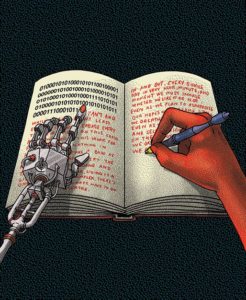Digital Humanities can be surmised as investigating humanity (and its byproducts) with new tools. Or, in a more active sense, digital humanists, such as myself, are, in essence, humans with [digital] tools exploring the world as it has been and what it could be.
As such, the field remains an evolving force that continuously approaches questions about defining humanness. Consequently, the Digital Humanities reflect how people construct and disseminate culture, which includes the perpetuation of the academic ivory tower that the field is often beholden to, making the Digital Humanities, occasionally, inaccessible to groups outside the fiscal and linguistic paywall. However, just as Digital Humanities reflect the flaws in society, the field exemplifies the species’ resilience and curiosity, as well as its desire for relevance, connectivity, and exploration. After all, without the human factor, the tools in question would not have the agency to further the field, no matter the content.
So, to me, the Digital Humanities is a transitional phase in the Humanities field, where people test the bounds of their culture with contemporary tools and use those tools to foster the conversation of what it means to be human.
Bibliography
“Digital Humanities: An Introductory Guide to the Wide World of the Digital Humanities (DH).” NYU Libraries, New York University, https://guides.nyu.edu/digital-humanities/getting-started.
“Digital Humanities?” Digital Humanites: An Introduction, McGill Library, https://libraryguides.mcgill.ca/dh101/home.
D. J. Cohen, F. Frabetti, D. Buzzetti. [Columbia University]. (2011, May 7). Defining the Digital Humanities [Video]. YouTube. https://youtu.be/Xu6Z1SoEZcc.


